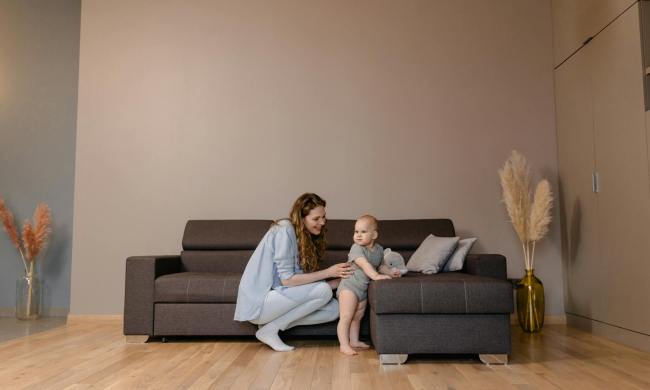Having a sick baby at home is almost as tough for parents as it is for the baby. When your little one is upset and can’t tell you what they feel, you get anxious wishing you could do more. Thankfully, congestion is one of the most uncomfortable symptoms that you can easily alleviate with an electric without any medicine. Electric nose aspirators are a safe and convenient must-have for every home with a newborn or young child.
Safe for baby
Especially designed for your infant’s delicate nose, aspirators gently remove mucus from their tiny nasal passages and help your baby breathe better. They are pediatrician-recommended products that are safe to use from birth, medically tested, and Food and Drug Administration-approved.

Once they can breathe well again, your baby will be so much happier and relaxed. This will also help them get the sleep they need, which means that their body gets the necessary rest to ensure a speedy recovery.
They are quick and easy to use
Like most adults, babies are also fussy when they’re not feeling well. But because they can’t speak or explain what they feel, sick babies will move around constantly, making it extra difficult for you to clean their nose with a tissue or a wipe. With a nasal aspirator, you can quickly extract the mucus that is blocking their passages with one hand only. This efficient device makes it fast and easy for you to help baby breathe comfortably again.
You can sleep better
When a baby can’t breathe comfortably, they cry and are very sensitive. It’s normal for you to feel uneasy when your baby is crying. New parents go through many sleepless nights when their babies are sick and can’t rest. But once you have cleared the baby’s nostrils with an efficient aspirator, both of you will breathe easily again. And when baby is finally asleep, you will also be able to get some much-needed rest.

Nothing beats the power of suction
The challenge with congested babies is in blowing their nose. Cleaning the surface or outer area with a tissue doesn’t really help with breathing. With an electric nose aspirator, you can remove that mucus for them.
Since children don’t really learn to blow their nose until they are toddlers, you can imagine that this is a device you’ll be using quite a bit during the first few years of your child’s life. Nasal aspirators are an excellent investment that will save your little one many tears and will safeguard hours of sleep for the whole family.
Reusable
The tips and collection cups of most aspirators are dishwasher safe, for your convenience and for the sanitation of your aspirator. This gives you the peace of mind that the pieces are always sterilized and safe to use, without creating additional work of boiling or washing by hand.
They are a reusable and eco-friendly alternative to tissues, while also being gentle and more effective than cleaning alone.
Medicine-free solution
If you prefer to avoid using decongestants, a baby nose aspirator is a good option to clear the passageways without the use of medicine. Of course, you should always consult with your doctor, especially if symptoms worsen or don’t improve in a timely manner.
Nontoxic
Most nasal aspirators are made from nontoxic, BPA-free materials that don’t harm your baby in any way. They clean easily and thoroughly, so you can be sure that no residues are left in your baby’s aspirator. Change the filters as needed, to maintain the safety and efficiency of your aspirator.

Great gift
A nasal aspirator makes an excellent gift for any parent-to-be. They may not know how much they need it yet, but when the baby gets sick, you can bet this device will make all the difference in baby’s well-being.
If you haven’t done so already, add it to your registry right away. You won’t believe how handy it’ll be when your child is unwell. You will find yourself using it from the time your child is a newborn until they are toddlers.
Alternatives to electric aspirators
For many new parents, an electric nasal aspirator may seem invasive. Others may be uneasy that the suction is too strong and will hurt the baby’s nasal passages. For some, the apprehension may be regarding hygiene. Another point that some parents raise is that the noise levels of some electric nose aspirators can stress out the baby. These are all valid and understandable concerns.
Electric nasal aspirators are recommended by pediatricians and considered safe to use on babies of all ages. They feature disposable filters and washable parts to keep things clean, and some are remarkably quiet.
If you are still unconvinced and would prefer another solution to remove your baby’s mucus, then perhaps a bulb nasal aspirator is a better choice for you. These manual devices have been around for ages to effectively ease the discomfort of congestion in babies.
Steam is also very helpful to help decongest your baby. Get the hot water running in the shower and, once the bathroom is nice and steamy, just go in there with the baby and let the water vapor loosen the mucus in your baby’s nasal passages. The results will be immediate.
Having a sick baby at home is truly one of the worst experiences for new parents. Though colds are an unavoidable reality for all parents and babies, there are ways to make it more bearable for everyone. When your baby gets sick, you can be prepared with an electric nasal aspirator in your medicine cabinet. This simple tool will make all the difference to your baby’s comfort, allowing them to breathe better, sleep more, and recover much more quickly than you imagined. Another additional bonus is that when your child sleeps well, so does the rest of the family.


